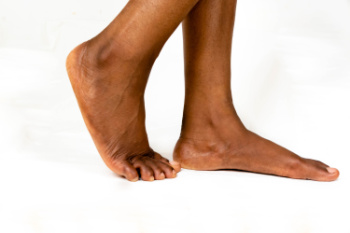
Flat feet, also known as pes planus, occur when the arches of the feet are absent or collapse, causing the entire sole to touch the ground when standing. Flat feet may lead to discomfort in the feet, ankles, or toes, and can sometimes affect balance or mobility. They also may result from undeveloped arches in childhood, injuries, or conditions that weaken the tendons and ligaments in the feet. Common symptoms include pain, swelling, and difficulty standing on the ball of the foot. Treatment options vary based on severity. Podiatrists often recommend custom orthotics to provide arch support, improve foot alignment, and relieve pressure on the joints. In some cases, immobilization with a brace or boot may help reduce strain on the affected area. For severe cases, surgery may be necessary to reconstruct the arch or adjust bone alignment. A podiatrist can assess the severity of your condition and determine the proper path to recovery. If you have problematic flat feet, it is suggested that you schedule an appointment with a podiatrist.
Flatfoot is a condition many people suffer from. If you have flat feet, contact Dr. Larry Cohen from New York City. Our doctor will treat your foot and ankle needs.
What Are Flat Feet?
Flatfoot is a condition in which the arch of the foot is depressed and the sole of the foot is almost completely in contact with the ground. About 20-30% of the population generally has flat feet because their arches never formed during growth.
Conditions & Problems:
Having flat feet makes it difficult to run or walk because of the stress placed on the ankles.
Alignment – The general alignment of your legs can be disrupted, because the ankles move inward which can cause major discomfort.
Knees – If you have complications with your knees, flat feet can be a contributor to arthritis in that area.
Symptoms
- Pain around the heel or arch area
- Trouble standing on the tip toe
- Swelling around the inside of the ankle
- Flat look to one or both feet
- Having your shoes feel uneven when worn
Treatment
If you are experiencing pain and stress on the foot you may weaken the posterior tibial tendon, which runs around the inside of the ankle.
If you have any questions please feel free to contact our offices located in Midtown, Manhattan New York, NY . We offer the newest diagnostic and treatment technologies for all your foot and ankle needs.

